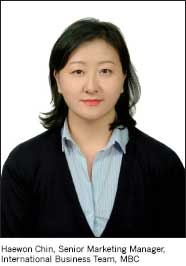
According to the governmental agency, Korea Creative Content Agency (KOCCA), this year’s MIPTV saw a total of 50 audiovisual companies taking part in the Korean Pavilion ‘Created by Korea’. Ranging from terrestrial TV networks to cable TV broadcasting stations, production companies and distributors, KOCCA says this is by far the largest number in the Pavilion’s history. KOCCA also noted the return of large scale dramas and documentaries. The director of mega hit MBC drama Jewel in the Palace, which has been exported to 60 countries, released his new drama Jewel in the Crown, Dong Yi. This TV biopic traces the tumultuous life of Lady Choi Sook–bin, who was born as a lowly commoner but entered the royal palace to become a royal concubine where she shone brilliantly. According to Haewon Chin, senior marketing manager, international business team at MBC, episode 25 (of 50) of the costume drama, Dong Yi recorded the highest rating 33.27 percent with the share of 46.54 percent. 










